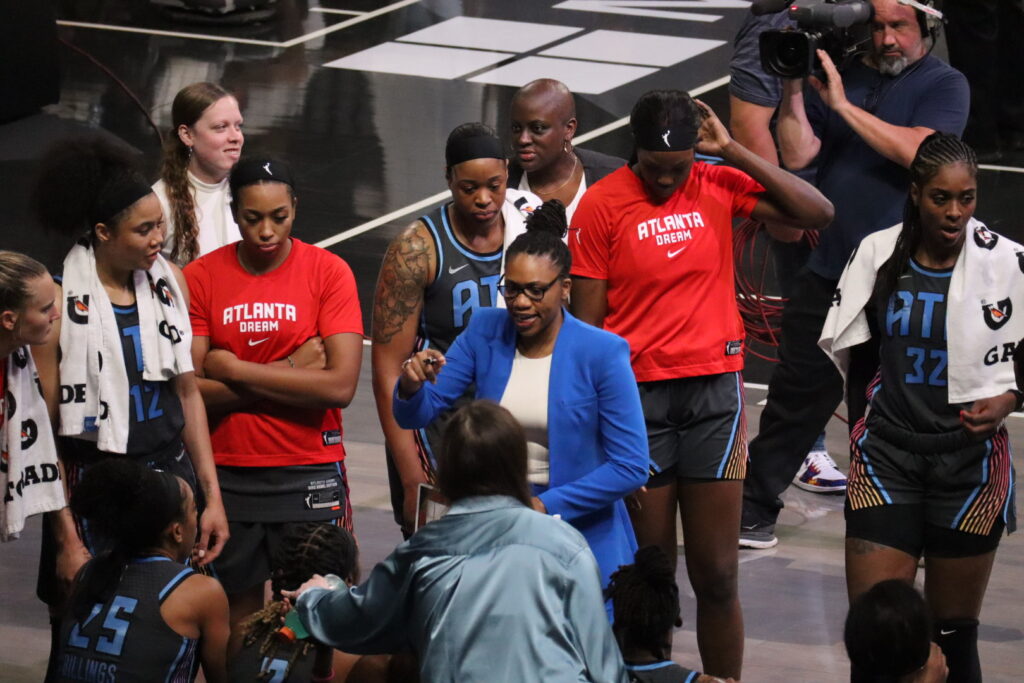We have made the difficult decision to part ways with head coach Tanisha Wright. pic.twitter.com/BkEkdrvWIR
— Atlanta Dream (@AtlantaDream) October 2, 2024
Defensive Strides
Under Coach T’s leadership, the Atlanta Dream made significant strides on the defensive end. The team consistently finished in the top half of the league for defensive rating during her three-season tenure. Wright’s emphasis on a defensive-minded culture paid dividends, as young talents like Rhyne Howard and Allisha Gray blossomed into All-Stars under her tutelage.
Offensive Woes
Despite the defensive improvements, the Dream struggled mightily on offense. In the 2024 season, Atlanta posted the league’s worst offensive rating, a glaring weakness that ultimately I believe this contributed to Wright’s dismissal. The team’s inability to convert defensive stops into points became a recurring theme, particularly in crucial moments of playoff games.
Playoff Appearances Not Enough as Dream Seek Deeper Postseason Runs
It’s apparent that playoff appearances was not enough as she successfully guided the Dream to consecutive playoff appearances in 2023 and 2024, the organization’s ambitions extend beyond merely reaching the postseason. The Dream’s front office decision to part ways with Wright reflects the organization’s desire to elevate beyond mere playoff appearances and become genuine contenders in the WNBA.
Evaluating the postseason performance, the Dream ended their playoff drought, a significant achievement considering the team’s tumultuous period before Wright’s tenure. However, first-round exits in both playoff appearances highlighted the need for further progress. The inability to advance past the initial round became a sticking point for a franchise eager to establish itself as a perennial contender in the WNBA.
While Wright’s defensive-minded approach yielded improvements, ranking the Dream in the top half of the league for defensive rating, it wasn’t enough to offset offensive struggles. The team’s league-worst offensive rating in 2024 underscored the need for a more balanced approach, capable of translating defensive stops into consistent scoring opportunities and, ultimately, playoff victories.
The bottom line is that the dismissal of Tanisha Wright from the Atlanta Dream reflects a larger shift in WNBA coaching philosophies. As the league evolves, teams are increasingly prioritizing adaptability and innovation in their leadership strategies.
Following the 2024 season, several WNBA franchises initiated coaching changes, signaling a collective push for fresh perspectives. This trend underscores the growing pressure on teams to remain competitive in an increasingly talented league. Franchises are seeking leaders who can not only develop players but also implement dynamic game plans that can adjust to the ever-changing landscape of women’s professional basketball.
As more teams join the coaching carousel, the WNBA is likely to see an influx of diverse coaching styles and backgrounds. This transition period could lead to innovative approaches in player development, game strategy, and team culture, potentially reshaping the league’s competitive dynamics in the coming seasons.
Coach T’s tenure with the Atlanta Dream was a period of growth and transition. While her defensive focus and leadership brought the team back to playoff contention, the organization’s desire for more substantial success ultimately led to this change. The Dream now face a critical juncture as they seek a new head coach capable of building on Wright’s foundation while addressing offensive shortcomings. This decision reflects the ever-evolving landscape of the WNBA, where teams must constantly adapt to remain competitive. As the Dream embark on this new chapter, their next choice of leadership will be crucial in determining whether they can transform recent progress into lasting success and championship contention.
You may also like
-
Atlanta Gladiators Sign Forward Peter Morgan for 2025-26 Season
-
Atlanta United Signs Defender Nyk Sessock and Midfielder Cooper Sanchez Ahead of Leagues Cup Match
-
Atlanta United Signs Midfielder Cooper Sanchez to Homegrown Contract
-
Pro Volleyball Federation and Major League Volleyball Unite to Form Landmark League
-
Falcons to Hold Out Penix, Cousins in Preseason Opener vs. Lions


